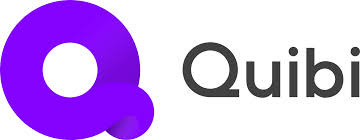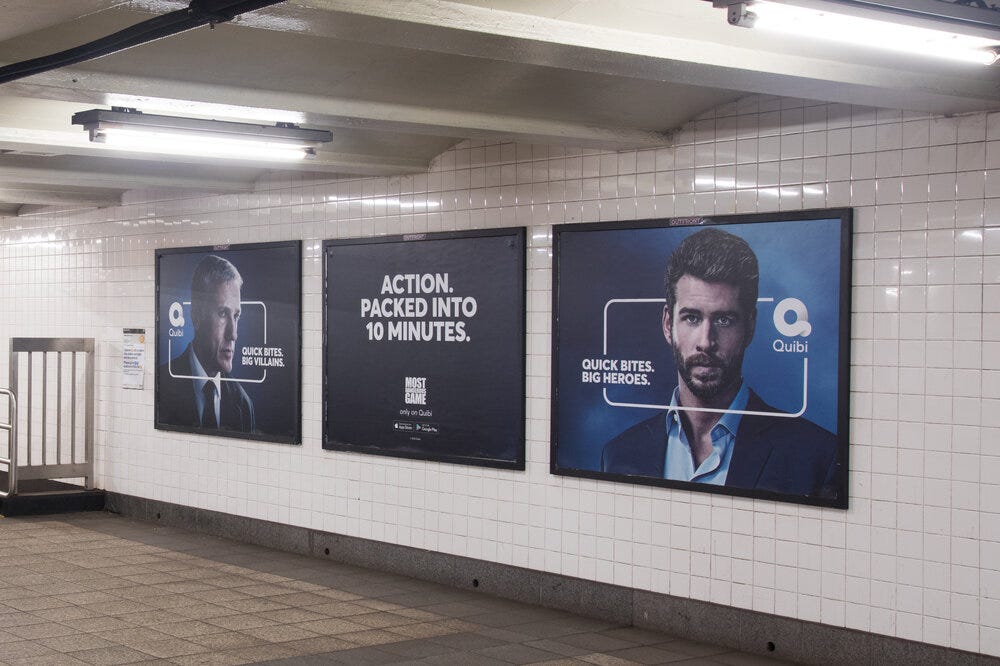Snapshot
Mobile first streaming service
Founded by Jeffrey Katzenberg and Meg Whitman in 2018 in Los Angeles, CA
Debuted 2019 and launched in 2020
2.9 million users (According to SensorTower)
Failed in about 6 months ⚰️
What is Quibi?
Ah, Quibi. The streaming service that was supposed to revolutionize how we watch TV on the go. Imagine this: 10-minute shows, crafted for your phone, perfect for squeezing in some entertainment while standing in line for coffee or pretending to listen to your boss in a Zoom meeting. Even the name, Quibi, was short for "quick bites." They even tried to make it a verb—"Hey, did you Quibi that new show yet?" A bold move, really.
The masterminds behind this little experiment were Jeffrey Katzenberg and Meg Whitman. Katzenberg, the Hollywood bigwig, and Whitman, the Silicon Valley veteran. These weren’t your run-of-the-mill startup founders; they had reputations, track records, and most importantly, deep pockets. They waltzed into the industry with a boatload of cash, big dreams, and the confidence of people who have been very successful before. Spoiler alert: it didn’t matter.
Why Quibi Failed
Let’s be real: Quibi didn’t just fail. It imploded. And no, you can’t just blame the pandemic, even though they tried. Quibi was toast the moment it launched. Why? Because it was an overfunded, overhyped, and utterly out-of-touch idea.
For starters, Katzenberg and Whitman raised a ridiculous amount of money—like $1.75 billion ridiculous. And sure, having a fat wallet might sound like a good thing, but in this case, it wasn’t. It’s like giving a toddler a flamethrower: too much power, not enough clarity about what to do with it.
There was no question that keeping us going was not going to have a different outcome, it was just going to spend a whole lot more money without any value to show for it
They thought Hollywood-level productions in bite-sized episodes would be the next big thing. But guess what? Viewers didn’t care. The shows were high-budget, sure, but no one wanted to pay for them after the free trial. Turns out, you can’t just sprinkle A-list actors on a bad concept and call it innovation.
Katzenberg and Whitman also seemed disconnected from their own creation. They were already wildly successful in their careers and had little to prove. Quibi was more of a vanity project than a do-or-die startup. And that lack of hunger showed.
TikTok vs Quibi
Now let’s talk about the elephant in the room: TikTok. While Quibi was out there trying to get us to care about 10-minute episodes of some fancy show, TikTok was busy stealing the spotlight with goofy dances, hilarious skits, and totally random nonsense.
The key difference? TikTok didn’t try to be fancy. It let regular people create content and then threw it into an algorithm that seemed to read your mind. TikTok understood its audience in a way Quibi never did. It wasn’t about perfection; it was about entertainment.
Quibi’s Hollywood-style productions couldn’t compete with the raw, unfiltered chaos of TikTok. And then there’s the money. TikTok’s user-generated content cost them next to nothing compared to Quibi’s mega-budget shows. No brainer, right?
Re-Invention
So, what if Quibi had been smarter? Could it have survived? Maybe. Here’s what they could’ve done:
Short form shows
Ofcourse keeping the naming convention of ‘Quick Bites’, Quibi, going would be their main feature. We love short form content in this modern era so a 10 minute show length would be perfect.
Content creators
If you pay the best content creators to produce content then produce they will especially if it also lucrative in other ways for them. Brand sponsorships, promoting their own personal brand, and access to an engaged audience.
Sociable
First off, they needed to make Quibi more social. People love to argue in comment sections, rate things, and feel like their opinion matters. Add a comment section. Let users rate shows. Make it feel like a community, not just a sterile streaming app.
A Free version
Let’s be honest: people hate paying for stuff, especially unproven stuff. Quibi should’ve gone full freemium. Give users a totally free version with ads and let them binge away. Hook them first, then ask for money later. People are more likely to pay when they feel like they’re already invested.
Quibi Mind Map
Closing Thoughts
Quibi had the potential to be something great—or at least decent. But it was so wrapped up in its own shiny packaging and overconfidence that it forgot the most important thing: understanding its audience. The streaming wars are ruthless, and Quibi walked in thinking it was a heavyweight when it was really just a rookie.
In the end, Quibi’s biggest flaw wasn’t its concept or its founders. It was its inability to adapt, learn, and stay hungry. And in the world of startups, that’s a death sentence.
Quibi Roast 🤡
Resources












